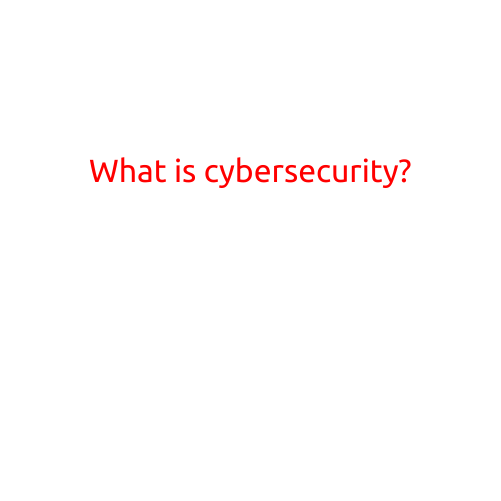
What is Cybersecurity?
In today’s digital age, cybersecurity has become a crucial aspect of our daily lives. With the increasing reliance on technology and the internet, it’s essential to understand what cybersecurity is, why it’s important, and how to stay safe in the online world.
What is Cybersecurity?
Cybersecurity refers to the practices, technologies, and mechanisms designed to protect electronic information and systems from unauthorized access, use, disclosure, disruption, modification, or destruction. It’s a broad term that encompasses a wide range of security measures aimed at preventing and responding to various types of cyber threats.
Types of Cybersecurity
Cybersecurity involves several layers of protection, including:
- Network Security: Protecting computer networks and communication systems from unauthorized access, use, or disruption.
- Application Security: Ensuring that software applications are secure and free from vulnerabilities that could be exploited by attackers.
- Endpoint Security: Protecting end-user devices, such as laptops and mobile phones, from malware and other types of threats.
- Data Security: Protecting sensitive data from unauthorized access, use, or theft.
- Infrastructure Security: Ensuring the security and integrity of computer systems, networks, and applications.
Why is Cybersecurity Important?
Cybersecurity is critical because it helps protect individuals, organizations, and governments from various types of threats, including:
- Data Breaches: Losing sensitive data, such as personal information or financial details, to unauthorized parties.
- Malware and Ransomware: Installing malware or ransomware on devices, which can lead to data loss, system crashes, or financial demands.
- Identity Theft: Using stolen personal information to impersonate individuals or access their financial accounts.
- Cyber Extortion: Being threatened with cyber attacks or data breaches if demands are not met.
How to Stay Safe in the Online World
To protect yourself and your digital assets, follow these best practices:
- Use Strong Passwords: Create complex, unique passwords and store them securely.
- Keep Software Up-to-Date: Regularly update your operating system, browser, and software applications to patch vulnerabilities.
- Use Antivirus Software: Install and regularly update antivirus software to detect and remove malware.
- Back Up Data: Regularly back up important data to prevent data loss in case of a disaster.
- Be Cautious Online: Avoid suspicious links, attachments, and downloads, and use two-factor authentication whenever possible.
Conclusion
Cybersecurity is a critical aspect of our digital lives, and it’s essential to understand what it entails, why it’s important, and how to stay safe online. By following best practices and staying informed, you can help protect yourself and your digital assets from various types of cyber threats. Remember, cybersecurity is everyone’s responsibility!





